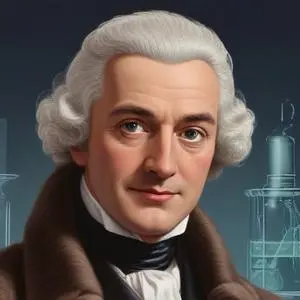Henry Cavendish: The Pioneering Chemist and Physicist
A Legacy of Groundbreaking Discoveries
Henry Cavendish is renowned for his momentous discovery of hydrogen, which he termed "inflammable air." This breakthrough, coupled with his precise measurements of the density of atmospheric air, properties of gases, and synthesis of water, cemented his reputation as a leading chemist and physicist of his time.
Early Life and Education
Born on October 10, 1731, in Nice, France, Henry Cavendish was the son of Lord Charles Cavendish and Lady Anne de Grey. Following his mother's passing in 1733, his father raised him and his brother, Frederick. Cavendish attended Newcomes School near London from the age of 11 and later enrolled in St Peter's College, Cambridge, in 1748, although he left without a degree in 1751.
The Cavendish Experiment and Legacy
Cavendish's most notable achievement is the "Cavendish experiment," which involved measuring the density of the Earth, allowing for the calculation of the gravitational constant. This pioneering work has had a lasting impact on our understanding of the natural world. His findings, published in his 1798 paper "Experiments to Determine the Density of the Earth," have been widely recognized and respected.
Philosophical Contributions and Beliefs
Cavendish's scientific pursuits were guided by a strong commitment to accuracy and precision. He was known for his meticulous approach to experimentation, which earned him a reputation for being an exceptional scientist. His work was characterized by a focus on empirical evidence and a dedication to advancing human knowledge.
Career Highlights and Major Works
- Discovery of hydrogen (1766)
- Measurement of the density of atmospheric air (1766)
- Calculation of the density of the Earth (1798)
- Development of a mechanical theory of heat
- Investigations into the properties of gases
- Synthesis of water
Influence on Modern Society
Cavendish's contributions to science have had far-reaching implications, influencing the development of various fields, including chemistry, physics, and geology. His work laid the foundation for future generations of scientists, inspiring new discoveries and advances in our understanding of the natural world.
Personal Characteristics and Anecdotes
Cavendish was known for his shy and introverted nature, which often led him to avoid public gatherings and scientific meetings. Despite this, he was respected by his contemporaries for his exceptional scientific skills and attention to detail. His dedication to his work and his passion for discovery continue to inspire scientists and scholars to this day.
Legacy and Historical Context
Henry Cavendish's groundbreaking discoveries and meticulous approach to science have left an indelible mark on the scientific community. His work continues to influence contemporary research, and his legacy serves as a testament to the power of human curiosity and ingenuity.
FAQ
What was Henry Cavendishs contribution to science?
Henry Cavendish was a French-English chemist, physicist, and philosopher who made significant contributions to science. He is best known for his discovery of hydrogen and his work on the composition of water.
What is Henry Cavendishs most famous experiment?
Henry Cavendishs most famous experiment is his measurement of the density of the Earth, which he conducted in 1798. This experiment, known as the Cavendish experiment, is still considered a landmark in the history of science.
How did Henry Cavendish influence the development of chemistry?
Henry Cavendishs work on the composition of water and his discovery of hydrogen helped to establish chemistry as a major scientific discipline. His work also paved the way for later chemists, such as Antoine Lavoisier and Joseph Priestley.
What was Henry Cavendishs relationship with the Royal Society?
Henry Cavendish was a fellow of the Royal Society, and his work was widely admired by his contemporaries. He was praised for his innovative experimental methods and his ability to make significant discoveries in a wide range of scientific fields.
What is Henry Cavendishs legacy in the history of science?
Henry Cavendishs legacy in the history of science is that of a pioneering chemist and physicist who helped to establish the foundations of modern chemistry. His work continues to be celebrated and admired, and he is remembered as one of the greatest scientists of the 18th century.

